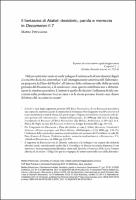Chapter Il fantasma di Alatiel: desiderio, parola e memoria in Decameron II 7
| dc.contributor.author | Petriccione, Matteo | |
| dc.date.accessioned | 2022-09-15T20:07:26Z | |
| dc.date.available | 2022-09-15T20:07:26Z | |
| dc.date.issued | 2020 | |
| dc.identifier | ONIX_20220915_9788855182362_91 | |
| dc.identifier.issn | 2704-5919 | |
| dc.identifier.uri | https://library.oapen.org/handle/20.500.12657/58295 | |
| dc.language | Italian | |
| dc.relation.ispartofseries | Studi e saggi | |
| dc.subject.classification | thema EDItEUR::D Biography, Literature and Literary studies | en_US |
| dc.subject.other | Alatiel | |
| dc.subject.other | love | |
| dc.subject.other | imagination | |
| dc.subject.other | morals | |
| dc.subject.other | fortune. | |
| dc.title | Chapter Il fantasma di Alatiel: desiderio, parola e memoria in Decameron II 7 | |
| dc.type | chapter | |
| oapen.abstract.otherlanguage | The aim of this essay is to analyse the story of Alatiel in its philosophical context, comparing the novella with the erotic and ethic conceptions in Middle Ages. From this point of view, it is possible to recognize two models in the story: the first is embodied by the lovers of the young woman and their savage behaviour, which seems to annihilate reason and morals, in line with the comment of Dino del Garbo to Donna me Prega. The second model is proposed by Alatiel, forced to indulge fortune’s will. Around this antithesis Boccaccio develops his narrative technique, switching focalization from Alatiel to her lovers, and again to Alatiel, to debate about one of the most important themes of the whole Decameron: human action between the context created by the fortune and moral choice. | |
| oapen.identifier.doi | 10.36253/978-88-5518-236-2.03 | |
| oapen.relation.isPublishedBy | bf65d21a-78e5-4ba2-983a-dbfa90962870 | |
| oapen.relation.isbn | 9788855182362 | |
| oapen.series.number | 219 | |
| oapen.pages | 15 | |
| oapen.place.publication | Florence |

